
As World’s Solar Leader
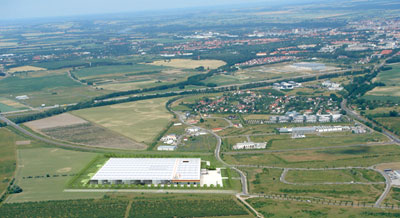
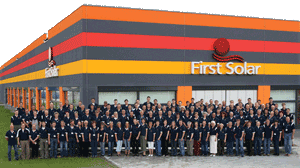
ermany is by far the world’s largest solar energy market, according to Solarbuzz, a San Francisco-based international solar energy research and consulting firm. Germany, which has provided incentives for individuals to install solar photovoltaics, accounted for 968 megawatts of solar energy demand in 2006. Individual residential applications accounted for about 41 percent of the market. Solarbuzz says Germany accounts for about 55 percent of the world’s production of solar electricity.
Major solar-related investment continues to come to Germany with U.S.-based firms investing in a large way. Much of the development is occurring in the former East Germany in a region near Poland which has earned the nickname “Solar Valley.”
First Solar recently opened a 120MW solar module manufacturing plant in Frankfurt. It’s not the familiar Frankfurt, but rather the one in the former East Germany, Frankfurt an der Oder. First Solar invested €115 million ($159.1 million) in the facility and received €45.5 million ($62.9 million) in incentives from the European Commission and the German government.
First Solar anticipates ramping to full capacity by the end of the year. The company uses a systematic “copy smart” replication process designed to enable addition of production lines rapidly and efficiently to achieve production comparable to its base plant in Perrysburg, Ohio, according to a spokesman. The facility will create more than 400 jobs.
Palo Alto, Calif.-based Signet Solar, a recent startup company, is establishing its first production line and its R&D headquarters near Dresden, in the State of Saxony. Signet has contracted with U.S.-based Applied Materials, a nanomanufacturing specialist, to develop a fully integrated thin film silicon solar PV module production line using the largest glass substrates in the industry.
Signet plans to begin production by mid 2008. The company’s customers include PV system integrators and installers of solar farms for power generation. Gunter Ziegenbalg, Signet’s managing director for Germany, says Signet will benefit from Saxony’s high-tech industrial environment where approximately 1,500 microelectronics and IT companies thrive.
Home-grown solar companies are investing, too.
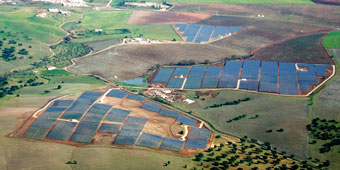
Hamburg-based Conergy moved into a former semiconductor factory in Frankfurt an der Oder and is refitting it for solar module production. Conergy plans to create 1,000 jobs.
The European solar boom is not confined to Germany. GE Energy Financial services, a unit of General Electric, invested $75 million to open one of the world’s largest solar power plants in Serpa, Portugal, in March. Shimmering photovoltaic modules, some 52,000 of them, are spread across a 150-acre (60-hectare) hillside and can generate enough electricity for 8,000 homes. Serpa, located 124 miles (200 km.) southeast of Lisbon, is in an agricultural region that is one of Europe’s sunniest areas.
Portugal provides incentives for solar energy development. The country’s carbon dioxide emissions have increased 34 percent since 1990 and the country is working to address the situation. The Serpa project relies on a preferential tariff mandated by the Portuguese government. The project received a $4.8 million grant from the Portuguese government’s Economic Modernization Program.
Opens Plant in Romania
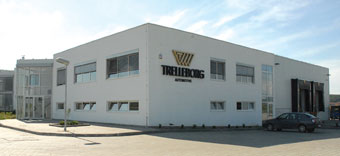
relleborg Automotive, a division of the Sweden-based Trelleborg Group, recently opened a new manufacturing facility in Dej, Romania. The plant will supply the Eastern European plants of a long list of customers including Audi, Dacia, Ford, Peugeot and Renault.
“We have a strong global platform that will be further reinforced by this plant,” says Peter Nilsson, Trelleborg president and CEO. “It is important to be close to the companies we supply to fulfill just-in-time requirements. This facility continues our commitment to the developing automotive sector in Eastern Europe.”
The Dej facility, which will employ 100 by the end of the year, will produce engine and chassis mounting systems.
Rolls Into Australia
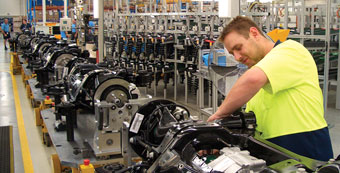
ZF Lemfoerder‘s ZF Car Chassis Division, has opened a plant in Adelaide, Australia. ZF invested $24.7 million in the plant which will supply Australian vehicle manufacturer GM Holden with axle systems. Germany-based ZF currently has 150 employees at the plant, which is the division’s 10th that specializes in complete axle systems.
The ZF Car Chassis Technology Division currently produces 850,000 axle sets per year at plants in North America, Asia, Europe, South Africa and Australia. GM Holden is a division of General Motors and is based in Port Melbourne, Victoria.
Site Selection Online – The magazine of Corporate Real Estate Strategy and Area Economic Development.
©2007 Conway Data, Inc. All rights reserved. SiteNet data is from many sources and not warranted to be accurate or current.